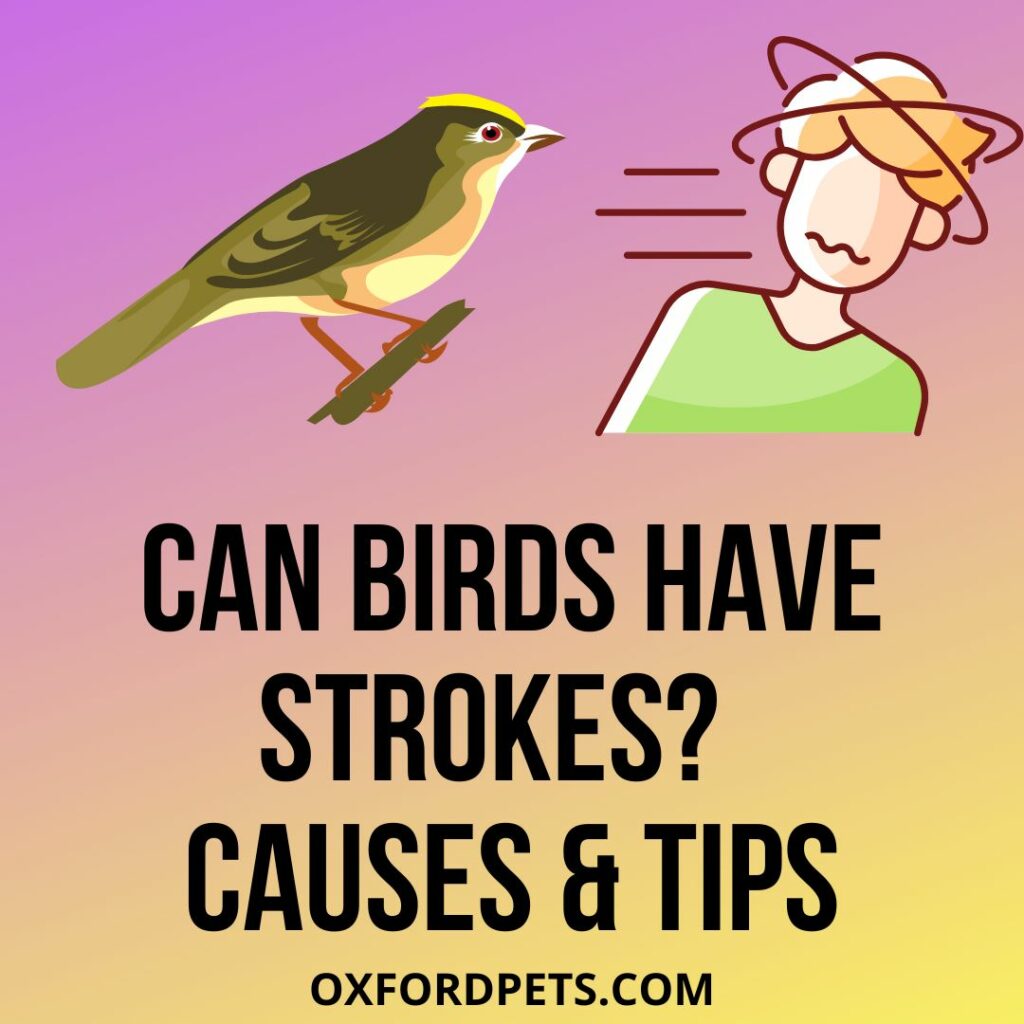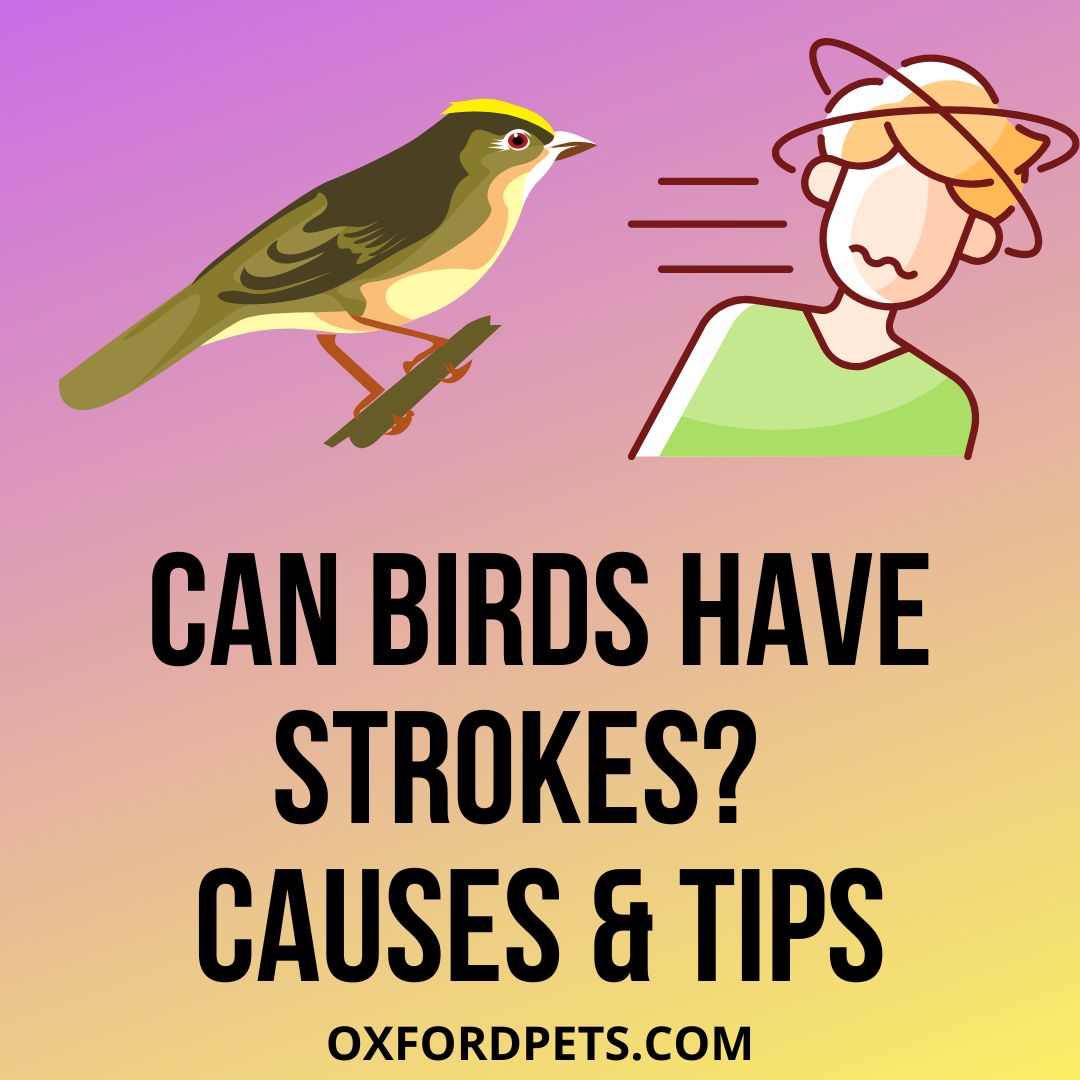Birds are amazing creatures that have emerged as our pets, so it’s far vital to understand any issues your bird would possibly face in its lifetime. In fact, you need to understand what to look at for certain illnesses to make sure the protection and fitness of your bird. But can birds have strokes?
Birds can suffer from distinct kinds of strokes that will range in severity. Therefore, the symptoms that you can see in a bird that represents a stroke are falling, paralysis, strange vocalizations, blindness, lack of appetite, and seizures.
Contents
How do you tell if a bird is having a stroke?
- Loss of appetite
- Partial paralysis
- Full paralysis
- Seizures
- Vocalization
- Falling
What Can Cause A Bird To Have A Stroke?
- Cerebral apoplexy
- Bad diets
- Sleep deprivation
- Old age
- Parasites and diseases
Can Birds Recover From Stroke?
Yes, birds can recover from stroke with-
- A good diet
- Physical therapy
- Move the bird to a carrier or box

Bird Seizures: Why Do They Happen? What Can You Do?
Can Birds Have Seizures
Seizures are scary to see. TIn fact, the bird can be unable to stand, fall off, lose consciousness, and showcase violent muscle spasms which include flapping wings and twitching legs.
On the other hand, the bird might also additionally just stand and stare blankly. Seizures might also additionally last from some seconds to 1 or 2 minutes. The bird will frequently appear confused, and might just sit on the ground of the cage whilst it recovers.
Bird Seizure Symptoms
Nutritional Deficiencies:
Deficiency of vitamins B or E, hypoglycemia (low blood sugar), or hypocalcemia (low blood calcium levels) can all cause head twisting, stumbling, paralysis, circling, or spasms.
Folic acid deficiency can reason neck paralysis in younger turkeys. Problems with the food regimen are the usual offender here.
However, careful diet evaluation and food regimen change, possibly with suitable supplementation, can assist to resolve these.
Physical Injury to the Brain:
Brain tumors, concussion, a stroke or blood clot withinside the brain, or being bitten in the head. Also, parasites and Brain tumors eat away at the brain structure and are commonly not treatable. Physical blow-kind damage can result in brain swelling, a depressed fracture, or a blood clot – the remedy is occasionally effective if commenced promptly.
Organ Disease:
Tumors of the reproductive tract or kidneys that press down at the nerves going into the legs can cause intense limping. In fact, proprietors initially assume the bird has damaged its leg. Atherosclerosis can lessen blood flow to the brain.
Infectious Diseases:
Some infections are acknowledged for inflicting central nervous system disorders. In fact, some microorganisms secrete toxins that may have an effect on the nervous system.
For example, avian botulism is because by Clostridium Botulinum that produces a severe neurotoxin ensuing in flaccid paralysis and even death.
Psittacosis is a bacterial disease that may bring about head twisting, tremors, and convulsions.
Toxicities:
Toxicities, because of toxins consisting of zinc, lead, or organophosphates can result in ataxia and convulsions.
How To Treat Seizures In Birds
Depending on the diagnosis, there are different remedies. A concussion may also require a quick course of steroids. However, toxicities would require medicinal drugs to bind and cast off the toxin.
Infections can generally be treated with antibiotics, antifungals, etc. Atherosclerosis, heart disease, and strokes have their own remedies. Sometimes anticonvulsant medicine is helpful.
Because birds cannot be expected to live still for prolonged durations with needles in them, the Certified Veterinary Acupuncturist rather injects a tiny drop of Vitamin B complex.
Paralysis In Birds: Signs, Causes, Diagnosis, Treatment
Depending on your bird and its age or health status, there can be many reasons for this condition. It typically influences the legs either in a single or both limbs, rendering your bird pretty helpless.
In fact, some birds can get better on some days, others take a lot longer, or they’ll succumb to the disease that caused it.
Symptoms of Paralysis in Birds
- Inability to maintain their neck up
- Paralysis can result in predation with the bird not able to move to safety
- Your bird may be not able to manipulate the third eyelid or neck muscles
- Inability to perch properly
- Inability to use their legs and wings
Causes of Paralysis in Birds
- The disease-based paralysis
- Tumors
- Toxic causes of paralysis include nicotine tobacco products including cigarette smoke
- Calcium deficiency or vitamin D deficiency
- Viral illnesses and infection
- Nerve damage resulting from injury
- Kidney troubles can cause paralysis
Diagnosis of Paralysis in Birds
As in the case with any bird fitness problem, it’s far beneficial to seek your vet’s recommendation as early diagnosis and remedy may save your bird’s life.
It is less complicated to deal with an ailment in its preliminary tiers than to attempt to assault it once it has established itself.
Hence, your vet will have a look at your bird and ask about its history. They will need to understand the sort of home your bird has, whether some other birds are displaying signs of paralysis, and what sort of diet your bird is on.
Sometimes it could simply be limited access to natural daylight causing a nutritional deficiency. Birds on the identical diet may additionally have malnutrition in a few vital areas.
Diagnosis is made with the exception of different reasons for the disease. Tests for disease footprints will permit the vet to decide what’s causing your bird suffering. Often hematology, radiography, fecal smears, and different tests will be performed to decide the cause.
Treatment of Paralysis
The treatment will range relying on the cause of your bird’s condition. However, even more so it’s going to depend upon the health or visible signs that are apparent. In a whole lot of cases, the precise cause is unknown.
Hence, the remedy begins with treating apparent signs which include infections. Broad-spectrum antibiotics can treat a bacterial cause. A change of food regimen and added dietary supplements can assist increase a weakened immune system or dietary deficiency.
Final words
If your pet has a stroke, it can be horrifying to undergo as you do not recognize what is going on or what you may do to assist. This may be overwhelming, and that’s okay; remember to take your vet’s recommendation and assist your bird’s recovery.
Ensure your bird always has a healthful diet and a vet check-up, as this may assist catch stroke-causing situations and illnesses earlier than they emerge as an issue.
So, that’s it in today’s article. I hope you liked it. We will be back soon. Till then, stay connected. Thank you.
Frequently asked questions
What Are The Signs Of A Bird Dying?
Trouble breathing
Excessive drinking.
Reluctance or inability to fly properly.
Roosting in open areas.
Sitting too still, even when approached.
Drooping wings
Slouched, unsteady posture.
Head listing to one side
Limping.
Why Is My Bird Having Seizures?
Some issues that cause a seizure include infections(Chlamydial, fungi, viral, or bacterial), tumors, vascular events that affect the brain, heatstroke, or trauma like flying straight to a solid object.
Can Birds Get Brain Damage?
Fractures, lacerations, or concussions can occur with any head injuries. In fact, birds can recover very quickly from many serious head injuries.
